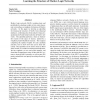1300 search results - page 111 / 260 » Probabilistic logic with independence |
STOC
2001
ACM
14 years 9 months ago
2001
ACM
We consider two-player games played for an infinite number of rounds, with -regular winning conditions. The games may be concurrent, in that the players choose their moves simulta...
GECCO
2009
Springer
14 years 3 months ago
2009
Springer
We present a probabilistic formulation of UCS (a sUpervised Classifier System). UCS is shown to be a special case of mixture of experts where the experts are learned independentl...
ICDM
2006
IEEE
14 years 2 months ago
2006
IEEE
Entity resolution is the problem of determining which records in a database refer to the same entities, and is a crucial and expensive step in the data mining process. Interest in...
ICML
2005
IEEE
14 years 9 months ago
2005
IEEE
Markov logic networks (MLNs) combine logic and probability by attaching weights to first-order clauses, and viewing these as templates for features of Markov networks. In this pap...
CVPR
2012
IEEE
11 years 11 months ago
2012
IEEE
Modeling objects using formal grammars has recently regained much attention in computer vision. Probabilistic logic programming, such as Bilattice based Logical Reasoning (BLR), i...

